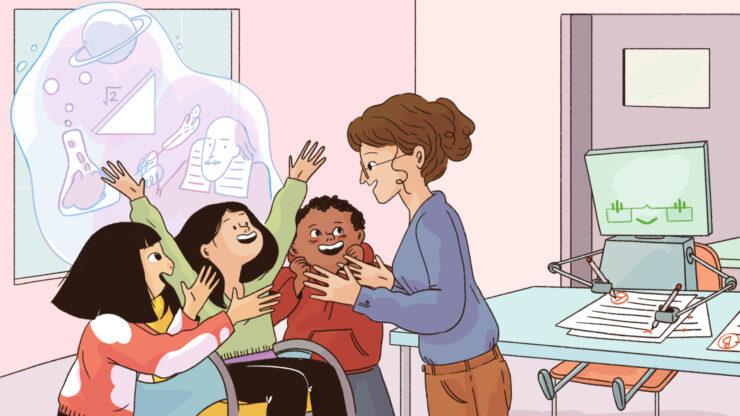The psychologist improving education with AI
Jennifer Meyer wants AI to support, rather than hinder, children’s learning

In her research, Jennifer Meyer seeks to identify factors that make teaching and learning with EdTech, particularly AI, effective. She hopes that AI will ultimately improve education for all learners, leaving teachers freer to foster meaningful connections with their students. Annie Brookman-Byrne finds out more.
Annie Brookman-Byrne: What are you trying to understand about EdTech and AI?
Jennifer Meyer: I’m looking at how to make EdTech in classrooms effective. For example, how can generative AI individualize education and help teachers address diverse learner needs? I explore the design and integration of AI-driven formative assessments in the classroom and examine the psychological factors that influence the effectiveness of AI. AI-based feedback can support teachers by providing immediate, actionable insights for students in response to their previous work, even in complex domains such as writing.
“AI-based feedback can support teachers by providing immediate, actionable insights for students in response to their previous work.”
Ultimately, I want to understand the psychological determinants of effective AI in education as well as the long-term implications, including how AI supports or hinders learning and how it might reshape educational processes in the future.
ABB: How is EdTech changing?
JM: Since the introduction of ChatGPT, the field has evolved ever more rapidly. Its trajectory over the next few years remains uncertain, yet full of potential. We need to discover what advancements in technology and AI will mean for education, and how these tools can best support teaching and learning. AI offers significant opportunities; addressing the challenges and potential downsides will help ensure that it is implemented responsibly in classrooms.
The growing use of EdTech also opens new avenues for collecting data in authentic learning contexts – real classrooms. The understanding of learning gained from controlled lab environments, combined with new insights into how learning unfolds in real-world settings using the new possibilities of EdTech and AI in particular, will give us a deeper understanding of learning processes. This will bring new perspectives and discoveries.
ABB: How do you hope your research will help children?
JM: A lot of my work has looked at why students differ in their educational success by considering their individual characteristics, including personality and motivation. I hope that technology will provide learners with better and more individualized learning opportunities, taking into account the complex interplay between the person and the situation. It is not yet fully clear how to make individualization most effective, but being mindful of students’ individual preferences and views can lead to more strengths-based approaches to education for everyone.
In a current project, we are exploring ways of implementing AI-based feedback in regular classroom learning. The focus is on hybrid feedback scenarios in which AI supports teachers’ feedback practices by co-creating the feedback, but we are also looking for ways to adapt feedback to the student’s language skills. The aim is to make it easier for students to make effective use of the feedback they are given. I hope that my work will contribute to giving children the skills and motivation to thrive in changing environments.
ABB: What are the biggest unanswered questions about EdTech and AI?
JM: One is how students and teachers will respond to AI-driven educational opportunities. For example, the meaning and impact of feedback are likely to be different when it is provided by AI rather than a teacher. This is a relatively underexplored area, but it is critical for integrating AI into education effectively.
“The meaning and impact of feedback are likely to be different when it is provided by AI rather than a teacher.”
Moreover, people’s attitudes toward AI-based educational tools in general will determine whether and how those tools are adopted, as well as their impact. Students and teachers are unlikely to use AI if they cannot see how it supports their educational goals, or if they lack trust in its output. We need to explore the factors that shape attitudes towards AI and the conditions under which AI tools are used most effectively. This will unlock the full potential of AI in education.
Another key question is how advances in AI will affect skill development. Students will not only use AI in educational interventions or adaptive learning systems; they will also develop their own patterns of use, for example with ChatGPT. While the first randomized studies are already emerging, much more work is needed to understand long-term effects and how using AI for educational tasks can support or interfere with skill acquisition. Relying too much on AI when practicing a certain skill may diminish students’ competencies when they perform that skill without AI. At the same time, however, students may develop other valuable skills. Also, personalized AI-driven interventions could increase the overall amount of effective teaching students receive, boosting their learning in the long run. But we don’t yet know when, for whom, or how such interventions are effective.
ABB: What are your hopes for the future of AI in education?
JM: I hope that research disciplines will collaborate in finding ways for AI to support all learners. While much remains uncertain, further research will show us what makes AI effective inside and outside the classroom. My hope is that AI will enhance educational outcomes for all students, ensuring that learning opportunities are equitable and inclusive.
“I envision AI as a supplement to classroom learning, not as a replacement for personal interaction.”
I envision AI as a supplement to classroom learning, not as a replacement for personal interaction. Ideally, AI will free up time and resources, allowing teachers to focus more attention on fostering meaningful connections with their students. A supportive classroom climate will remain the basis of successful education, and this is not likely to be achieved by AI alone. Future research and practice should prioritize examining not only students’ cognitive outcomes after AI is integrated into the classroom, but also the impact of AI on the metacognitive, social, and emotional dimensions of learning.
Footnotes
Jennifer Meyer is an Assistant Professor for Educational Diagnostics and Counselling in Schools at the Centre for Teacher Education at the University of Vienna. Her research focuses on the determinants of the effective use of artificial intelligence in education, especially in the context of formative feedback. She is particularly interested in the role of students’ individual prerequisites for learning as well as the importance of individual differences in understanding the effectiveness of learning opportunities using educational technology. Jennifer is a 2024-2026 Jacobs Foundation Research Fellow.
Jennifer on X.
This interview has been edited for clarity.

